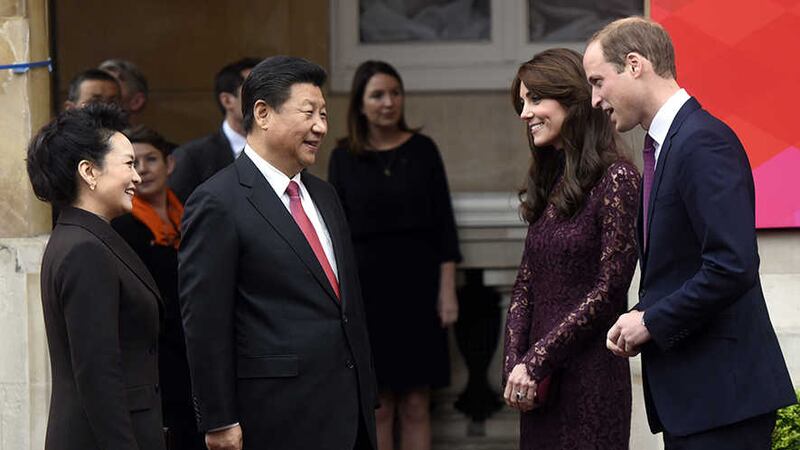Robert Hannigan’s desktop must be infinitely more interesting these days.
The senior civil servant is well known locally, respectively as a former communications director and political director at the NIO.
He’s currently head of GCHQ - Britain’s intelligence surveillance and eavesdropping agency.
One of Mr Hannigan’s tasks this week will be ensuring his department closely monitors the state visit to Britain of China’s president Xi Jinping.
British intelligence agencies are said to be cagey about their own Treasury’s unbridled embrace of China’s promised pot of investment gold. (So too are their US counterparts.)
That’s why GCHQ is insisting on an ‘access all areas’ contract to the inner workings of Chinese firms which help build the new £24bn Hinkley Point nuclear power reactor in Somerset – likely to be one of the major deals signed off this week.
Of course, GCHQ’s focus on access to Chinese companies presupposes that it currently grasps what’s going on in its own backyard, across Whitehall. But that situation is far from certain.
Chancellor George Osborne seems set on selfishly establishing his long-term prime ministerial credentials with quick-wins which cement a high-profile Chinese commercial partnership (while Britain's steel industry collapses).
But he’s using typically unpolished Bullingdon Club tactics, and they grate with the slower strategic playbook of Foreign Office-type ‘deep blue’ thinkers. They also appear to arrogantly underestimate the sophisticated stretch of Beijing’s smartest planners.
“We want the UK to be China’s best partner in the West,” is Mr Osborne’s current mantra.
That's partly why he didn’t mention China’s record of human rights violations while visiting the country last month. Prime minister David Cameron will likely sustain the silence this week.
Instead, the dissident ‘Dutch boy’ taking his finger out of the diplomatic dyke will be Labour leader Jeremy Corbyn, who’ll probably raise human rights during his ‘one-to-one’ meeting with President Xi.
Rather than this state visit being a symbolic staging-post for Mr Osborne’s wooing of Beijing, it actually suggests that Whitehall’s power-brokers are muddled in a strategic fog.
Not only does the British government’s unwillingness to criticise China over human rights violations indicate weakness (or even desperation) in building their relationship. But it must also be seen in the context of other factors.
For example, the Tory agenda is being dragged along by the runaway train of debate around full or partial ‘Brexit’ from the EU, and China has been grasped as the de facto alternative economic partner (safety-net?).
In addition, Mr Osborne in particular is personally fixated with his own career ascendancy, while Britain’s military interventions in the Middle East are, at best, now chaotic and strategically stunted.
Domestically, public policies (which were already disjointed and dysfunctional) are being recast around counter-productive Tory economic, social and security values, that will provoke unpredictable instability.
None of those fluid factors – political, personal, military, or public policy – denotes stability in Britain’s strategic decision-making.
The crucial underlying consideration is this: the key factors influencing Britain’s current approach to Beijing are being driven by short-term tactical power objectives spanning no more than the next two or three general election cycles.
The British Treasury’s engagement with China is thus a tactical reaction to factors of circumstance, rather than a strong positive strategy to proactively shape stable international partnership.
China is firmly in the driving seat, as long as its economy is growing. And Mr Osborne is happy for Britain to buckle up as passengers (and big business to hitch a profitable ride), as long as he becomes prime minister.
No doubt some of China’s interests are driven by equally ambitious politicians.
The difference is that China currently has the strength-in-depth to engage with the world largely on its own terms in the market of global capital. Britain does not.
That point struck me profoundly while slurping home-made noodle soup with some Chinese friends a couple of nights ago.
I asked how they were able to communicate in Chinese while using a ‘qwerty’ keyboard displaying the English alphabet.
My friends explained that part of their childhood education involved learning the phonetic English spellings of their Chinese words and characters. (Imagine suggesting the equivalent process in Ireland?)
This long-term learning puts them ahead of the curve – understanding and communicating with English, while preserving the importance of their own culture and history.
China is the largest nation on earth with 1.4 billion citizens. Its strategic economic, energy, military and infrastructure partnerships are focused more than ever now on Moscow, not Mayfair (including a proposed 7,000 km direct rail link to Beijing).
Britain’s relationship and status with China is strictly in the second division – regardless of the premiere pictures being painted this week. You don’t need to be the man running GCHQ to figure that much out.
j.kearney@irishnews.com








